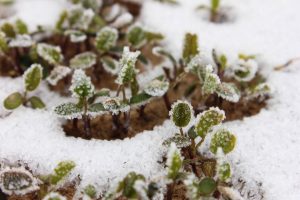 As cold as it has already been this winter in so many areas, Frosty Berseem Clover might be just the ticket for farmers and ranchers implementing frost seeding into their hay and pasture systems.
As cold as it has already been this winter in so many areas, Frosty Berseem Clover might be just the ticket for farmers and ranchers implementing frost seeding into their hay and pasture systems.
Grassland Oregon was recently awarded a patent for Frosty Berseem Clover, making it the first cold tolerant berseem clover suitable for frost seeding in the United States and Canada, surviving in trials with temperatures as low as 5 degrees Fahrenheit and zero snow cover. Extended growing seasons, higher yields, increased establishment rates and convenience are just a few of the benefits to frost seeding, according to Jerry Hall, director of research for Grassland Oregon.
“Frost seeding is the broadcasting of seed onto the frozen surface of the soil. Ideally, it is done at a time when there is either no snow or a minimal amount. The freezing and thawing cycle of the soil surface will allow for the seed to work into the top .25 inches of soil,” Hall explains. “Seeds will then germinate and begin growing as soon as weather conditions become favorable – allowing producers to gain a couple of weeks of growth versus waiting for the soil to firm up enough to drill the seed in.”
Hall says Frosty Berseem Clover is excellent for frost seeding into declining alfalfa fields and also blends nicely with alfalfa due to its similar quality and appearance.
